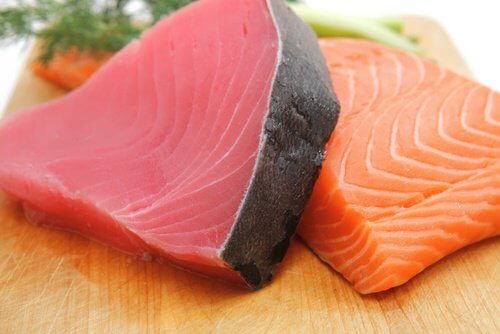Everyone has read or heard that oily fish is very good for our health. Mackerel, sardines, anchovies and salmon are all wonderful superfoods for our hearts and brains. This is because they are rich in omega-3 fatty acids, so as you may already understand, you want to get this richly in your diet. Let's start at the beginning.
What are omega-3 fatty acids?
Omega-3 fats are a family of long-chain polyunsaturated fatty acids, which are distinguished from saturated and monounsaturated fatty acids because they contain two or more carbon-carbon double bonds in the fatty acid chain. There are three main types of omega-3 fatty acids: ALA, DHA and EPA. Your body is able to make certain fats (lipids) from other fats, but omega-3 fatty acids are essential fats that your body cannot make (ALA) or can make very inefficiently (EPA and DHA) itself, so you must consume them instead. Omega-3 fatty acids are important for the heart, brain, joints, eyes and general health, so you really want to get enough of these.
Why people quickly become deficient in omega-3 fatty acids
Omega-3 fatty acids, especially EPA and DHA, mainly comes from fish with a higher fat content. Unlike other countries where fish is a staple of food (such as Japan and Korea), the average person falls short of the recommended weekly fish consumption. And therefore also has a deficiency of omega-3 fatty acid intake. Let’s go back in time and talk about the weekly fish recommendation. In 2000, the American Heart Association (AHA) published a formal dietary recommendation of two servings of (ideally fatty) fish per week in the journal Circulation. This is the starting point for the general population, and that amount of fish comes out to about 500 milligrams of EPA and DHA per day to support overall health and heart health. Assumptions are good points to start with, but the AHA recommends a higher intake of marine omega-3 (1 gram and more EPA and DHA per day) for targeted cardioprotective and cardiovascular benefits. Unfortunately, achieving 1 gram of EPA and DHA would be the omega-3 equivalent of eating one serving of fish a day, which comes with obvious challenges (cost, heavy metals, usability, etc.).
What is wisdom
Of course, we can (and should) eat more fatty fish to ensure we get these healthy omega-3 fatty acids that our bodies need. This is of course not feasible or desirable for everyone. Therefore, supplementation can be a godsend. Of course it is very important to use a good supplement. It comes down to this: Yes, you really do need omega-3 fatty acids. And yes, it can be difficult to get enough fish in your diet to ensure your body is getting all the EPA and DHA it needs. If you have a good supplement, it is possible to compensate for the deficiencies.
https://www.sunganiumoyo.com/consultation/life-health-therapy/

